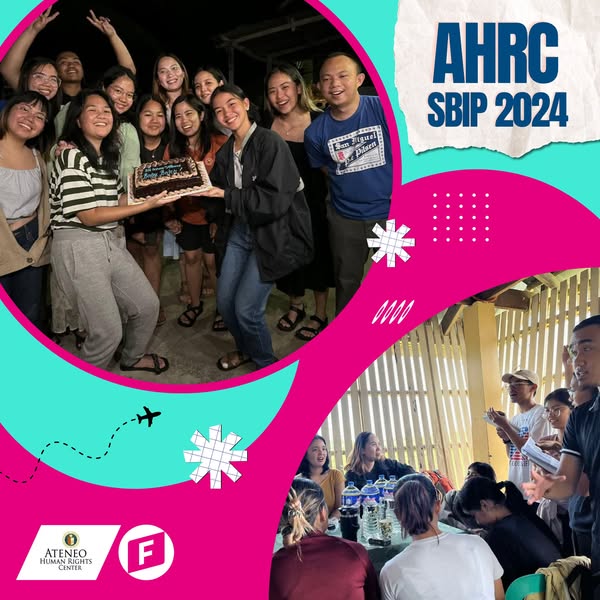PHILIPPINES
Ateneo's 2024 Internship Program Trains Future Human Rights Lawyers Through Immersion and Advocacy

Participants of the AHRC SBIP 2024 posed for a photo.
© AHRCThe Ateneo Human Rights Center (AHRC), in collaboration with the Friedrich Naumann Foundation (FNF) Philippines and the Ateneo Law School, successfully held the 2024 Semestral Break Internship Program (SBIP) with the theme, “Forming Future Human Rights Lawyers and Advocates Through the Internship Program.” The program, designed to expose law students to human rights advocacy, ran from January 2024 and featured a combination of classroom discussions, community immersion, and an evaluation session.
The SBIP’s objective was to equip law students with the knowledge and skills necessary to advocate for vulnerable groups, particularly in the context of legal challenges faced by these communities. This year’s program aimed to provide students with hands-on experience in alternative and developmental lawyering, empower marginalized groups by connecting them with legal experts, and promote access to justice. The program also focused on teaching students about the fundamental rights guaranteed by law and how these can be asserted or claimed by vulnerable communities.
The program began with a Basic Orientation Seminar (BOS) in Quezon City, which ran over four days and was designed to enhance participants' understanding of the national human rights situation. Interns learned about law concepts, key human rights principles, and the paralegal skills required to support access to justice. The seminar included both lecture-style sessions and interactive skills workshops to provide a well-rounded foundation in human rights law and advocacy. Participants also visited various non-governmental organizations that work on issues such as access to justice and alternative lawyering, offering them a broader perspective on the legal landscape.
From January 12 to 18, 2024, the interns took part in the immersion component of the program, which was held in the rural areas of Casiguran, Aurora. Here, they worked closely with host families, including fisherfolk, indigenous peoples, and farmers, from several barangays. Many of the indigenous families in Casiguran belong to the Agta community. The immersion aimed to provide students with firsthand insight into the daily struggles faced by these communities, such as land disputes, political pressures, and the effects of red-tagging. By interacting directly with the community, the interns were encouraged to apply their legal knowledge to address these challenges.

Participants during the Basic Orientation Seminar.
© AHRCOne of the interns shared, “The immersion was the highlight of my internship experience. It was an opportunity to push our limits and step outside our comfort zones.” The intern further noted the difficulty of the struggles faced by families, including issues related to land ownership and the intimidation of political figures. These experiences allowed participants to see the intersection of law and real-life advocacy, reinforcing the value of their training.
The program concluded with an evaluation segment held from January 18 to 20, 2024, at Lotus Sun and Waves Resort in Baler, Quezon. This component provided a space for the interns to reflect on their experiences, especially their time spent in the communities. During several reflection sessions, the interns assessed the issues they encountered, both during their immersion and in the program overall. They also developed an action plan to address these issues in collaboration with AHRC as they continued their legal training and advocacy work.
In total, 14 law students were accepted into the SBIP, and 12 of them successfully completed all three components of the program. Through this initiative, the interns were not only exposed to the realities faced by marginalized groups but also trained in alternative lawyering and human rights advocacy. By combining academic knowledge with practical experience, the program helped prepare the students to pursue their personal goals of becoming effective human rights lawyers and advocates.
The SBIP is an important step in building a future generation of legal professionals dedicated to human rights, access to justice, and the empowerment of vulnerable communities across the Philippines.
This article is written by Pie Escobar, the Communication Officer for the Friedrich Naumann Foundation for Freedom Philippine Office.

Photos of the participants during the internship sessions.
© AHRC